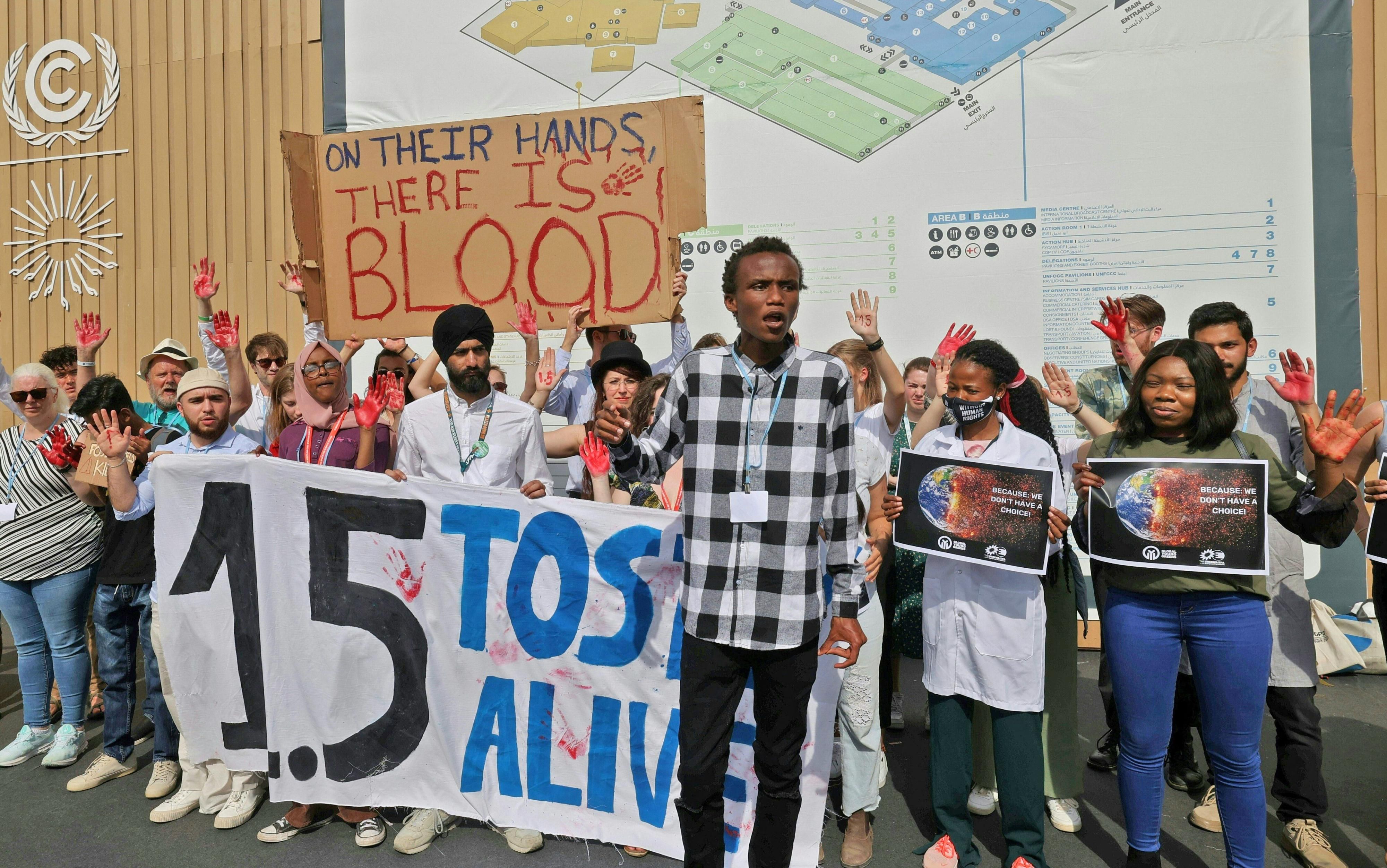‘Abdication of Responsibility’: Fury as COP27 Draft Omits Oil and Gas Phase-Out
Republished from Common Dreams under Creative Commons (CC BY-NC-ND 3.0). Feel free to republish and share widely.
“At a COP shaped by more than 600 fossil-fuel lobbyists roaming the halls, parties fighting for progress must push back against weak language that allows the fossil fuel industry to continue its deadly expansion,” said one campaigner.

Julia Conley November 17, 2022
Climate action groups were outraged Thursday as global policymakers released a draft agreement making clear that dire warnings from energy experts and scientists regarding fossil fuel extraction have not gotten through to them, with the document failing to endorse a phase-out of oil and gas use.
The draft agreement was published as the 2022 United Nations Climate Change Conference (COP27) comes to a close in Sharm el-Sheikh, Egypt, and is expected to be heavily revised in the coming days.
“As climate impacts and injustice accelerate, lives, livelihoods, cultures, and even whole countries are lost, the latest draft cover note from the COP27 presidency pushes the pedal to the metal on the highway to climate hell.”
The absence of crucial language regarding oil and gas left campaigners concerned that the conference, where hundreds of fossil fuel lobbyists were present, will ultimately fail to produce an agreement that treats the climate crisis with the urgency needed.
“We came to Sharm el-Sheikh to demand real action on meeting and exceeding climate finance and adaptation commitments, a phase-out of all fossil fuels and for rich countries to pay for the loss and damage done to the most vulnerable communities within developing countries by agreeing a Loss and Damage Finance Fund,” said Yeb Saño, Greenpeace International’s head of delegation at the summit. “None of that is on offer in this draft. Climate justice will not be served if this sets the bar for a COP27 outcome.”
The draft agreement “encourages the continued efforts to accelerate measures towards the phase-down of unabated coal power and phase out and rationalize inefficient fossil fuel subsidies.”
It also echoes the call in last year’s document out of COP26 to emphasize “the importance of exerting all efforts at all levels to achieve the Paris agreement temperature goal of holding the increase in the global average temperature to well below 2°C above pre-industrial levels and pursuing efforts to limit the temperature increase to 1.5°C above pre-industrial levels.”
But the omission of a phase-out of all fossil fuel extraction, which delegates from India have lobbied for at COP27 and which the U.S., U.K., and European Union expressed conditional support for in recent days, denotes a draft document that “ignores the science of 1.5°C” even as it pledges to limit the temperature increase, said Tzeporah Berman, chair of the Fossil Fuel Non-Proliferation Treaty Initiative.
“Acknowledging only the need to phase down coal while ignoring oil and gas is hugely problematic. This predatory delay is out of line with the science and with 1.5 degrees,” Collin Rees, campaign manager at Oil Change International, told Bloomberg. “At a COP shaped by more than 600 fossil-fuel lobbyists roaming the halls, parties fighting for progress must push back against weak language that allows the fossil fuel industry to continue its deadly expansion.”
The draft is the first agreement out of an annual U.N. climate conference to address “loss and damage”—the harms already suffered by countries in the Global South due to the climate crisis and the need for wealthy governments to help finance their recovery.
The document does not provide details about how a loss and damage fund would operate, saying only that it “welcomes” the inclusion of the issue in the final agreement.
“More than 40 million people in the Horn of Africa are currently experiencing climate-induced hunger crisis,” said Nafkote Dabi, climate change policy lead for Oxfam, on Wednesday. “Pakistan is faced with $30 billion worth of loss and damage from the recent mass floods that left a third of the country under water. It is crucial that developing countries can access a formal fund to pay for the damages and losses they are already suffering today.”
Rich countries must meet their $100 billion annual goal for climate finance in addition to establishing a new Loss and Damage fund that is fit for purpose, accessible and gender responsive,” Dabi added. “Rich countries must heed the urgent call and deliver a loss and damage fund at COP27.”
Related Content

As COP27 Failure Looms, Climate Movement Demands: ‘Phase Out All Fossil Fuels’
The document includes some areas of improvement over the agreement written at COP26 last year, such as a call for multilateral development banks to scale up climate finance “without exacerbating debt burdens” for countries in the Global South, but leaves out details on how wealthy countries must strengthen their emissions-slashing targets.
“There should be a clear road map by those who are emitting a lot to start reducing their emissions,” Collins Nzovu, Zambia’s environment minister, told Bloomberg. “We are headed completely in the wrong direction—driving very, very fast into a ditch.”
Saño condemned the draft as “an abdication of responsibility to capture the urgency expressed by many countries to see all oil and gas added to coal for at least a phase-down.”
“As climate impacts and injustice accelerate, lives, livelihoods, cultures, and even whole countries are lost,” he added, “the latest draft cover note from the COP27 presidency pushes the pedal to the metal on the highway to climate hell.”
Republished from Common Dreams under Creative Commons (CC BY-NC-ND 3.0). Feel free to republish and share widely.

